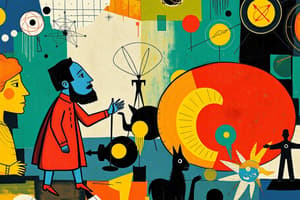Podcast
Questions and Answers
What was the primary method of knowledge acquisition during the Ancient Science period?
What was the primary method of knowledge acquisition during the Ancient Science period?
- Pure thought combined with experimentation (correct)
- Mathematical modeling of natural phenomena
- Religious scriptures interpretation
- Experiential learning through observation
Which organization had significant control over scientific and philosophical expressions during the Middle Ages?
Which organization had significant control over scientific and philosophical expressions during the Middle Ages?
- The church (correct)
- The monarchy
- Scientific societies
- Universities
What significant approach emerged during the Modern Ages following the Renaissance?
What significant approach emerged during the Modern Ages following the Renaissance?
- An emphasis on traditional authority
- The rejection of empirical observations
- The introduction of religious doctrines
- The establishment of the Scientific Method (correct)
What major change characterized the Renaissance period in relation to accepted scientific norms?
What major change characterized the Renaissance period in relation to accepted scientific norms?
What was a significant outcome of the Scientific Revolution that began during the Late Middle Ages?
What was a significant outcome of the Scientific Revolution that began during the Late Middle Ages?
How did the church's perspective on scientific inquiry change during the Renaissance?
How did the church's perspective on scientific inquiry change during the Renaissance?
What was believed to be the cause of illnesses during the Middle Ages?
What was believed to be the cause of illnesses during the Middle Ages?
What was one of the outcomes of the advancements in transport technologies during the Modern Ages?
What was one of the outcomes of the advancements in transport technologies during the Modern Ages?
Which reasoning methods were introduced during the Enlightenment Period?
Which reasoning methods were introduced during the Enlightenment Period?
How did early farmers contribute to the Scientific Revolution?
How did early farmers contribute to the Scientific Revolution?
What was a defining feature of scientific thought during the Late Middle Ages?
What was a defining feature of scientific thought during the Late Middle Ages?
In what way did the relationship between the church and science evolve by the end of the Renaissance?
In what way did the relationship between the church and science evolve by the end of the Renaissance?
What pivotal event during the Renaissance contributed to intellectual freedom?
What pivotal event during the Renaissance contributed to intellectual freedom?
What aspect marked the emergence of modern science during the Modern Ages?
What aspect marked the emergence of modern science during the Modern Ages?
What motivated scientists during the Renaissance to replace flawed knowledge?
What motivated scientists during the Renaissance to replace flawed knowledge?
Which development during the Renaissance did NOT directly contribute to the establishment of the Scientific Revolution?
Which development during the Renaissance did NOT directly contribute to the establishment of the Scientific Revolution?
What is a scientific paradigm primarily defined as?
What is a scientific paradigm primarily defined as?
How does a paradigm shift differ from a small modification in scientific theory?
How does a paradigm shift differ from a small modification in scientific theory?
Which statement best describes the emergence of Science Technology and Society Studies (STS)?
Which statement best describes the emergence of Science Technology and Society Studies (STS)?
What was the primary focus of Silent Spring regarding DDT?
What was the primary focus of Silent Spring regarding DDT?
Thomas Kuhn's concept of a 'paradigm shift' suggests that it is acceptable to transform which aspect of scientific inquiry?
Thomas Kuhn's concept of a 'paradigm shift' suggests that it is acceptable to transform which aspect of scientific inquiry?
What central theme did Stephen H. Cutcliffe assign to Science Technology and Society Studies?
What central theme did Stephen H. Cutcliffe assign to Science Technology and Society Studies?
Which of the following statements regarding DDT is NOT true?
Which of the following statements regarding DDT is NOT true?
What societal influences does the STS field primarily address?
What societal influences does the STS field primarily address?
What was a major consequence of Ralph Nader's book 'Unsafe at Any Speed'?
What was a major consequence of Ralph Nader's book 'Unsafe at Any Speed'?
Which of the following best describes the initial understanding of pesticide use prior to Rachel Carson's investigations?
Which of the following best describes the initial understanding of pesticide use prior to Rachel Carson's investigations?
What persistent issue was highlighted by Ralph Nader regarding the automobile industry?
What persistent issue was highlighted by Ralph Nader regarding the automobile industry?
What type of health issue has the World Health Organization recognized related to gaming?
What type of health issue has the World Health Organization recognized related to gaming?
Which major impact did Rachel Carson's work have concerning environmental awareness?
Which major impact did Rachel Carson's work have concerning environmental awareness?
What was one of the primary roles of the National Highway Traffic Safety Administration as stated in Nader's influence?
What was one of the primary roles of the National Highway Traffic Safety Administration as stated in Nader's influence?
What did the introduction of safety features like airbags and anti-lock brakes signify for the automotive industry?
What did the introduction of safety features like airbags and anti-lock brakes signify for the automotive industry?
How did the automobile's impact on society evolve over the last century according to Nader's perspective?
How did the automobile's impact on society evolve over the last century according to Nader's perspective?
Flashcards are hidden until you start studying
Study Notes
Ancient Science (60,000 BC to 650 AD)
- Knowledge developed through pure thought and experimentation to understand theoretical concepts.
- Discovery of patterns in nature revealed rules governing the universe, allowing predictions about natural behavior.
Middle Ages (3rd to 12th Centuries)
- Intellectual stability prevailed, with church oversight on scientific and philosophical inquiries.
- Truths about nature were derived from biblical teachings and Aristotelian philosophy.
- The belief existed that health depended on the balance of four bodily fluids.
Late Middle Ages: Renaissance Period (1350s – 1650s)
- Marked transition from medieval to modern thought with the onset of geographical explorations.
- Botanists began challenging Aristotelian norms prompting intellectual freedom and reconstruction.
- The Protestant Reformation led to questioning established beliefs, paving the way for the Scientific Revolution.
Scientific Revolution (1450 – 1630)
- Series of events transformed societal views on nature, encompassing advancements in various scientific fields including physics, chemistry, and biology.
- Brick-by-brick dismantling of erroneous ancient beliefs that the church had upheld for centuries.
- Farmers initiated empirical observations of environmental conditions to enhance agricultural yields.
Enlightenment Period
- Emerged from the Scientific Revolution as scientists sought to define laws governing natural phenomena.
- The church transitioned from opposition to scientific inquiry, recognizing it as a form of appreciating divine creation.
Modern Ages (1650s - Present)
- Establishment of the Scientific Method, introducing inductive and deductive reasoning.
- Scientific thought applied to both scientific and non-scientific subjects, eventually reducing the church's influence.
- Advancements led to improved prevention and treatment of diseases, as well as breakthroughs in astronomy.
- Exploration and imperialism surged due to advancements in transportation technology.
Scientific Paradigm Shift
- A scientific paradigm represents the commonly accepted views and research directions in a discipline.
- Paradigm shifts, as explored by Thomas Kuhn, create radical changes in scientific theories and perceptions of reality.
Science, Technology, and Society (STS)
- An interdisciplinary field focusing on science and technology as social constructs with profound societal implications.
- Emerged in the mid-1960s amidst growing skepticism regarding the uncritical valorization of science and technology.
DDT and Environmental Concerns
- DDT, a pesticide, initially used extensively, later revealed harmful environmental impacts highlighted in Rachel Carson’s "Silent Spring."
- Carson documented the misuse of powerful chemicals without understanding their potential harms.
Automotive Safety Advocacy
- Ralph Nader’s book "Unsafe at Any Speed" criticized car manufacturers for inadequate safety measures prior to the introduction of federal safety regulations.
- Nader’s work resulted in the creation of the National Highway Traffic Safety Administration to promote vehicle safety.
Recognizing New Health Concerns
- "Gaming disorder" acknowledged by the World Health Organization as a mental health condition, reflecting a shift in understanding health in a digital age.
Studying That Suits You
Use AI to generate personalized quizzes and flashcards to suit your learning preferences.




